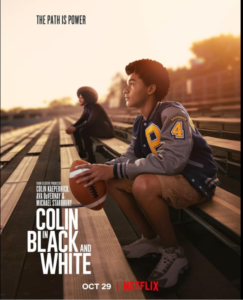
Remember in 2016 when the San Francisco 49ers’ quarterback knelt during the national anthem, triggering a major controversy across the nation? Yes, Colin Kaepernick is his name, and he now has a Netflix limited series called “Colin in Black and White.” If you haven’t watched it yet, I suggest after reading this spoiler that you dissect his story yourself.
Throughout the series, Kaepernick narrates his childhood experiences that shaped the person he is today. His story is beautifully told for viewers to not only understand his background but to be enlightened on systemic racism in America.
In each of the six episodes, Kaepernick gives the definition to racial terms with examples of how the term has been or can be acted on. Racism is not a concept you are born into; it’s something you learn as you experience life. Giving Kaepernick those moments to explain segments of racism was great because racism stems from ignorance.
The lack of knowledge is instantly seen in the first episode with Kaepernick’s parents telling him that he will get decision fatigue from thinking about hairstyles like cornrows. The scene pauses and transitions to Kaepernick talking about one of his greatest inspirations, Allen Iverson. A former star basketball player, Iverson chose to embrace his culture by styling his hair in cornrows disregarding being portrayed as disrespectful, unfocused and unprofessional.
“Because you look like a thug,” was the response his mother gave him after he questioned why they wanted him to cut his hair. You can see the disheartened expression take over young Kaepernick’s body after being severely shamed by those who are supposed to understand him the most. Her statement was traumatizing to the point where Kaepernick did not get cornrows again until 14 years later.
He opens the series by making the powerful comparison of slave auctioning to the NFL. Scouts, recruiters and owners want the best man to play in terms of strength, weight, health and capabilities. This system is similar to how slave masters bid on the Africans that looked the strongest and healthiest to get the work done in the field.
“Coaches will tell you they’re looking for warriors, killers, beasts,” Kaepernick says. “They say they want you to be an animal out there.”
Black people have always been dehumanized and the series makes sure to address that issue in different instances. In one episode, a mock interview is performed with a white man being the interviewer and the Black man being the interviewee. The interviewer boldly describes the Black man as “clean,” which insinuates he believes Black people are like animals — dirty or savage-like.
When traveling to different cities for baseball games, Kaepernick, who is biracial and the only person of color on his team, deals with judgment and discrimination from hotel employees.
“Micro-aggressions … it refers to small behavioral indignities,” he says. “Intentional or not, that communicates derogatory racial insults that leave us feeling degraded, dehumanized and offended.”
The “Who makes the rules?” question appears throughout the series. Who made the rule that white people get lighter consequences for their actions in contrast to Black people? Who made the rule that a Black person deserves aggression and the feelings of fear from authorities?
It may seem as though the entire series is about race, but Kaepernick beautifully recounted his experiences during the series. His experience with love and going to school dances is portrayed. The typical peer pressure teenagers experience is seen in certain episodes. In addition to battling racism and oblivious parents, Kaepernick was dealing with the pressures of his baseball coach wanting him to go to the major leagues.
“Being a quarterback is all I’ve ever wanted my whole life,” young Kaepernick told coach Roger Theder. “Every night I sleep, I dream of playing in the Super Bowl. It’s the only way I know how to operate and the only way I want to. Being a quarterback isn’t an option for me. It’s in my blood.”
After working his way up from the freshmen team to the junior varsity to training with Theder during the off-season, young Kaepernick began to feel all his hard work was going to waste. He didn’t get any scholarship offers to play football until the last episode ends with young Kaepernick receiving an offer from Nevada. After experiencing racism, social pressure and self-identity issues, Kaepernick tells himself that all those good and bad experiences built him into the man he is today.
“Rejection is not failure,” Kaepernick says. “Trust your power. Love your Blackness. You will know who you are. Sincerely, Colin.”
With such great production, I vote for there to be a season two to launch.